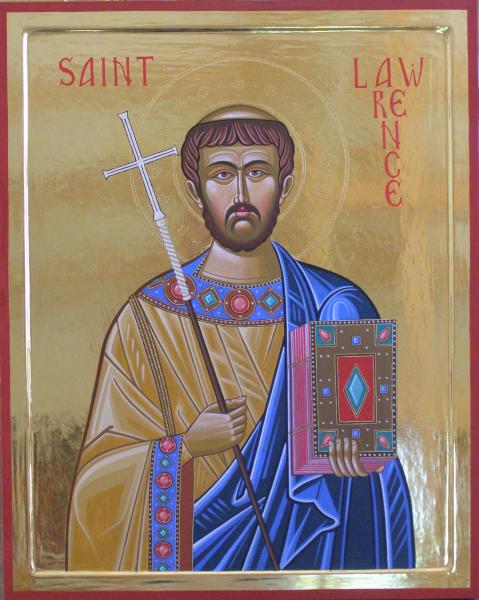St.
Laurence of Canterbury (Reposed 2 February, 619). Laurence was
one of the monks who had accompanied St.Augustine on his
mission to the Kingdom of Kent and, once King Ethelbert was
baptised and the Christian Faith was firmly established in
his kingdom, he became the Archbishop's chief assistant.
Augustine was worried that in the event of his death the new
converts might return to paganism and so he consecrated
Laurence as his coadjutor bishop to succeed him when he
died.
Laurence
was industrious when he became Archbishop and renewed
Augustine's efforts to win over the Celtic Church to the
customs of the Roman, but the mission suffered a severe
setback, for with the death of Ethelbert the people of Kent
began to fall away from their new faith. This was largely
due to Eadbald, the new king, who had not followed his
father in becoming a Christian and had offended against
Church law by marrying his stepmother. The remonstrations by
the Archbishop only served to make the king more determined
in his heathen practices and Laurence began to despair,
deciding with his fellow bishops, Mellitus of London and
Justus of Rochester, to abandon the English nation as beyond
redemption.
Mellitus
and Justus left the country and Laurence was to follow them
on the next day. For his last night he had a bed prepared in
the abbey church before the High Altar, and after he had
said his prayers he went to sleep. At the dead of night he
was awoken by a vision in which the Apostle Peter scourged
him with a great whip, asking him the reason for his
desertion.
"Why do
you forsake the flock committed to you?" he asked. "To
what shepherds are you leaving Christ's sheep, who are among
wolves? Have you forgotten my example, who for the sake of
these little ones that Christ gave me as a token of His
affection, suffered at the hands of unbelievers chains,
beatings, imprisonment, tortures and finally crucifixion
that I might be crowned with Him?"
In the
morning Laurence went to Eadbald and showed him the scars of
the beating that he had received, and the King was horrified
to learn that hands had been laid upon such a holy man,
demanding to know who had presumed to use him so. When the
Archbishop told him, the King was greatly impressed and,
renouncing his marriage, was baptised into the Christian
Faith.
Mellitus
and Justus returned, and St. Laurence continued to build up
the Church of Christ in England. When he died his body was
interred in the abbey church, where he had had his vision,
and he was remembered by a hospital in the Old Dover Road,
which is part of Watling Street (now replaced by the County
Cricket Ground still bearing his name.)

